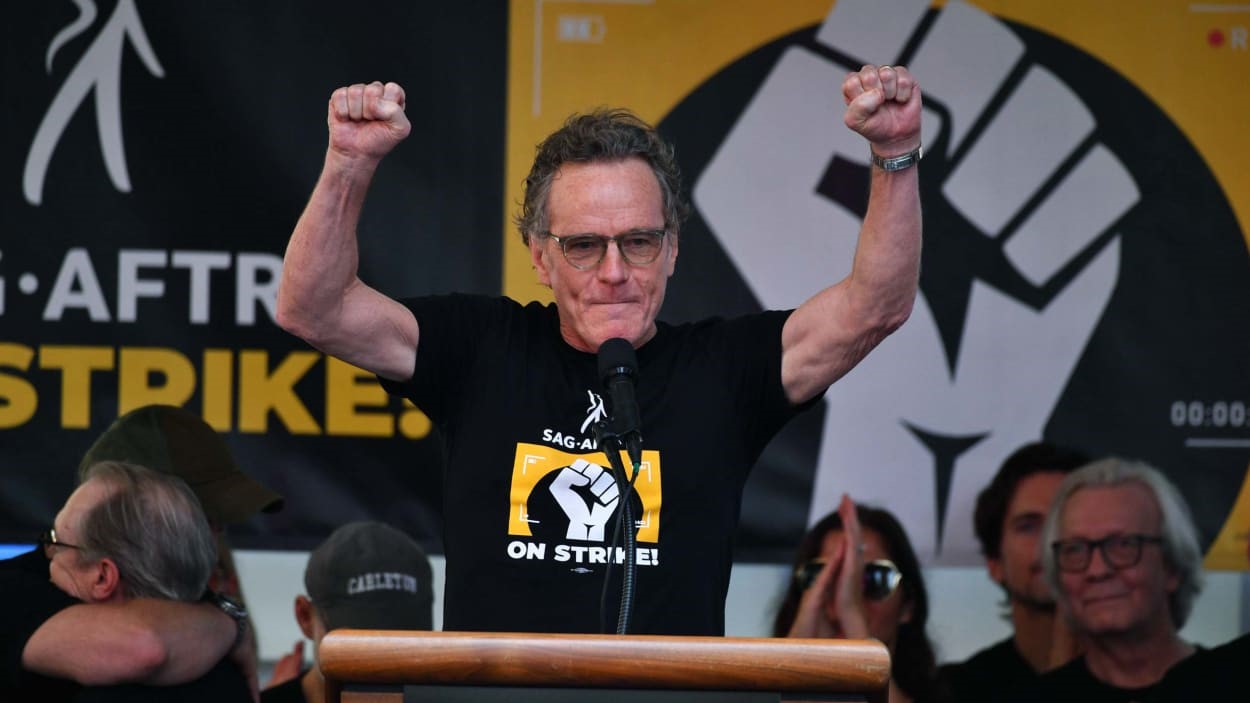Fran Drescher, Bryan Cranston, and others are recasting Luddites as heroes
By Julie Scelfo
Oh, don’t be such a Luddite.
We all know what this dig means—but, in retrospect, it’s clear the Luddites, British weavers, and textile workers who took sledgehammers to mechanized looms in the 1800s, were actually ahead of the curve.
“We will not have our jobs taken away and given to robots!” we imagine them yelling.
“We will not have you take away our right to work and earn a decent living!”
“And, most importantly, we will not allow you to take away our dignity!”
If these quotes sound vaguely familiar, it’s because actor Bryan Cranston shouted them recently at a rally for striking SAG-AFTRA workers.
Turns out the Luddites were on to something, and Hollywood’s laborers know it. The writers, actors, and actresses on strike are not unlike 19th century textile workers setting their factories on fire. It’s 2023, but they’re facing the same man-versus-machine battle the Luddites faced during the Industrial Revolution. AI is the mechanized loom that means the end of countless workers’ ability to ply their trades, earn living wages, and provide for their families.
For most of human history, it’s been a largely accepted truth that technological innovation should always be regarded as an advancement we should champion.
But now that AI threatens the very foundations of human enterprise—by obliterating the fundamental concepts of truth and authorship, among other things—the time has come to realize that the Luddites were smart enough, and bold enough, to reject the idea that more tech is always better.
Hollywood is doing the same (as are some pretty cool teenagers).
While the rest of us are acting like overeager “technochauvinists,” running blindly ahead with AI and ChatGPT, incorporating them into our future no matter the costs, Hollywood workers are honestly accessing what adopting these new technologies means giving up. They’re actually listening to what the creators of the tool itself have already admitted: it should be a global priority to mitigate the risk of human extinction from AI (with no less a tech evangelist than Elon Musk admitting even the Unabomber “might not be wrong” about how technology threatens our basic humanity, and Charlie Kaufman told Variety that embracing AI means giving up parts of human experience that are “primal” and “essential”).
SAG-AFTRA president Fran Drescher puts it this way: “If we don’t stand tall right now . . . we are all going to be in jeopardy of being replaced by machines.”
Wireless telegraphy “cost” us the art of handwritten letters, but extinction? The stakes have never been higher.
We’ve already seen what unregulated social media (driven by AI) has cost us: depression, anxiety, loneliness, and childhood suicide, plus waning social and personal connectedness and the rise of racist, misogynistic, and sexist ideologies. Why would we think something as powerful as AI would be benign?
It’s the basic principle of yin and yang—for every advance, there’s a retreat. For every invention, there’s a related regression.
As a species, we’re at a point in our evolution where we can do so much more with technology than we can with our own bodies. We can replace not just actors and writers, but also artists, researchers, drivers, surgeons, teachers, and who knows who else—but just because we can do something, doesn’t mean that we should.
The Luddites weren’t rubes but sages—recognizing, as did this recent major UNESCO report, that not all change constitutes progress.
More than 200 years later, we’re running out of time to let that sink in. We invented plastic and plasticizers presumably to make our lives more convenient, but we polluted the planet, and even our breast milk is filled with plastic particles. Progress? We invented fast food and factory-produced snacks (so handy!), but it turns out they lack nutrition, so the most revered restaurants give us . . . Slow Food.
Sure, we have to be willing to accept some costs for technological improvements—but only if they truly benefit humanity. At every turn, we must regard what’s offered as “new and improved” by companies with a critical eye to determine if it’s in our best interest. Not just Silicon Valley’s.
We’re drowning in a multibillion-dollar propaganda campaign to convince us that technology is here to save us, but Hollywood knows a villain when it sees one—and the real-life Hollywood workers are acting like the Luddites and fighting back. It’s time for the rest of us to wake up and do the same.
A former staff writer for the New York Times, Julie Scelfo is executive director of Get Media Savvy, a nonprofit working to establish a healthier media environment for kids and families.
(4)



